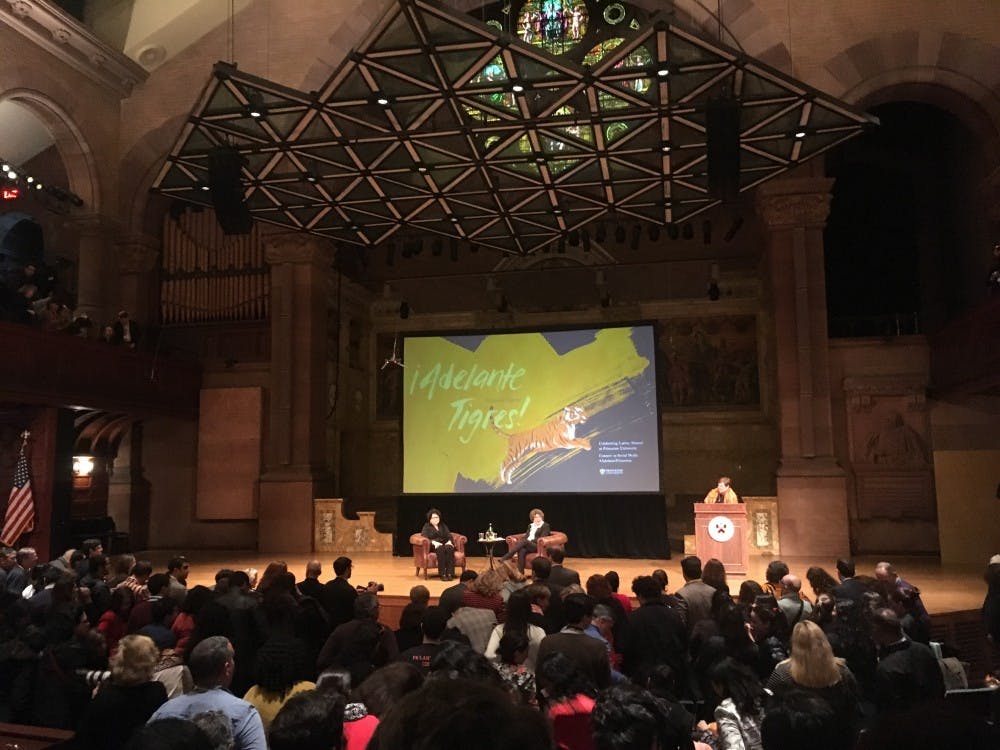The Honorable Sonia Sotomayor ’76 believes that service is of utmost importance, no matter what form it takes — and she urged her listeners to make giving back a central part of their lives.
Captivating the audience with her signature humility, wit, and confidence, Sotomayor shared her insights and advice with a crowd of University alumni and current students on April 1 as part of a conference on the history and experiences of Latino students and alumni at the University. Sotomayor is an Associate Justice of the Supreme Court of the United States and is the first Latina to hold this title.
Accompanied by University Trustee Margarita Rosa ’74, Sotomayor first recounted her experience at the University, telling stories of how others have impacted her personal and professional narratives. She also fielded questions from the audience, walking among audience members on the floor of Richardson Auditorium. As she gave responses, she posed for photos and hugged enthusiastic audience members.
Audience member Angie Freeland ’11 expressed her admiration for Sotomayor. Freeland said that as a young attorney, she saw Sotomayor as a personal inspiration and “an inspiration for the Latino community and to young women across the country.”
In Sotomayor’s discussion with Rosa, the first Hispanic and first female to serve as the commissioner of New York State Division of Human Rights, she highlighted that everyone has at least one thing in common: we have someone to guide us. Thus, everyone should pay it forward — we should be the ones to guide someone else, she said, addressing audience members.
“Someone or something happened to give us that break,” Sotomayor explained. “Someone who saw something within us and guided us.”
With this in mind, she posed the question, “How many of us in this room are actively, every day looking for that life within a touch?” she said. “We have a continuing obligation to ensure that we’re actively seeking out those that need that touch forward.”
Describing her time as an undergraduate, Sotomayor explained that she would sometimes find herself feeling alienated or confused by certain social or cultural aspects of campus given her humble upbringing.
“I guess what I learned to do at Princeton was to ask questions. And that has helped me throughout my entire life. What I didn’t know, I asked,” she said. “I continue to say that every day I learn things I didn’t know and I see it as an advantage.”
Sotomayor addressed her role in changing the University’s unofficial motto in Oct. 2016 from “Princeton in the nation’s service and in the service of all nations” to “Princeton in the nation’s service and the service of humanity.” In her contributions, she explained how she considered what service and community meant to her on both personal and global scales.
“Service to me meant what my life has been. It’s caring, it’s giving, and that’s where the phrase ‘service in the name of humanity’ came from,” she said. “If we start there, everything else good will follow.”
Sotomayor emphasized the importance of service throughout one's life, no matter the form it takes.

“I don’t care how you serve. I just want you to serve," she said.
Sotomayor’s role on the Supreme Court prevents her from answering questions that could compromise her impartiality as a judge. Therefore people's questions sought Sotomayor’s advice on character and life rather than her opinions on the current political climate.
When asked what she was most proud of in her life, she addressed her deep connection with her family and those who have touched her life.
“What am I the proudest of? That I’ve never walked alone. That all of the people who I have known have taken every step with me,” she explained.
“It’s great that we are looking back and celebrating what we have accomplished but also at the same time carrying out what still needs to be done,” Freeland said about the conference's importance.
Sotomayor spoke during the conference “¡Adelante Tigres! Celebrating Latino Alumni at Princeton University” March 30 through April 1. The conference featured presentations, alumni discussion groups, networking opportunities, campus tours, and social events. Featured speakers included President Christopher Eisgruber ’83, American Civil Liberties Union executive director Anthony Romero ’87, and Secretary of the State of Rhode Island Nellie Gorbea ’88.
Contributor Jane Sul contributed reporting to this article.








